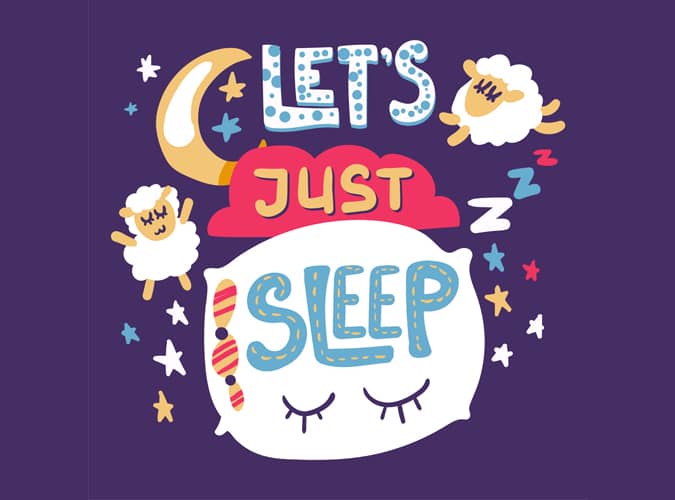Another lockdown! Can we use this time to help remedy our lack of sleep?

No one really knows why we sleep. It is the mysterious shift in consciousness that our bodies require everyday and we can’t survive without it. Sleep is complex. It serves many vital functions – both physically and mentally. It regulates your mood, improves your memory but also maintains health, weight and energy levels.
Some people are very lucky and are great sleepers, unfortunately there are many among us who have difficulty either getting to sleep and/or staying asleep. Getting just one bad night’s sleep can impact how we feel the following day. The immediate effects include poorer memory and reaction times and research shows that repeated changes to sleep patterns can have long term health problems. In fact, there doesn’t seem to be one biological function that doesn’t benefit from a good night’s sleep.
Since we’re in another lockdown, should this be the time to fix our sleep issues?
First you should try to address what’s causing your lack of sleep.
Is the isolation of Covid -19 restrictions keeping you awake? It’s difficult for people of all ages not being able to see your friends and loved ones. Are you worried about your/your children’s education? Money issues always cause anxiety, especially in the current climate. Maybe your concerned about your grown-up children and their future? Is the stress of working from home while balancing family life keeping you up at night? Or perhaps your sleep deprivation is due to a young baby/ toddler keeping you up at night?
Unfortunately, there is no one fix solution, but at Pharmhealth pharmacy we’d like to give you some tips to bring you a peaceful night’s sleep.
Sort out your Bedroom
- Make your bedroom a desirable place to sleep, a sleep sanctuary if you like. If it’s clean and welcoming you’re more likely to fall asleep easier. Check that your mattress and pillows are the correct type for how you sleep in the bed, as they may need changing and could be older than you think!
If you feel the need to re-decorate at some stage; muted tones are more harmonious for deep sleep than bright colours. And using essential oils like lavender, chamomille and clary sage sprayed on your pillow can help you drift off and induce a deeper sleep.
- Keep the temperature between 16-18°C, if you’re too hot or cold this will affect your sleep. Children and older people may need it warmer than this but find the right temperature for you.
- Remove as much tech as you can- try to not look at your phone for an hour before bedtime (very difficult- but do try).
- Ensure it is dark, this is not so much an issue at this time of year but blackout blinds/curtains can help make a difference ( the body produces a hormone called melatonin and this is triggered by darkness).
Maintain a sleep routine
- Try to go to bed and waken at the same time everyday- to help to maintain a regular sleep pattern.
- Set an alarm to try to waken at the same time everyday including weekends, this will help your body’s sleep-awake cycles- this should not be an issue for those with young children!
- Empty your bladder before bedtime.
- Avoid caffeine (tea and coffee) and alcohol too close to bedtime.
- Keep a notepad close-by your bed and make a list of the things that are occupying your mind – this will hopefully prevent you from troubling you during the night.
- Don’t nap during the day.
- Wind down with warm, milky drinks and herbal teas
Diet and Exercise
Sports and exercise can help you to enjoy a better quality of sleep. Working out gently but not excessively can tire your body out, promoting a better night’s sleep. Releasing pent up tension through exercise is also highly beneficial, helping to banish stress before bedtime. Exercising also lowers your body’s temperature, which induces better sleep. Yoga is renowned for its relaxation and sleep benefits, while moderate-aerobic exercise like walking has been found to help people fall asleep more quickly.
Relaxation and stress relief
We all lead stressful lives. Demanding jobs, long hours and active families all contribute to a hectic lifestyle, and that’s not helped by the intense social media pressures (to look or be a certain way) that surrounds us. These elements make it very difficult to wind down.
There is a direct correlation between anxiety and rhythm of sleep. When a person is anxious, their heart rate increases, which causes the brain to ‘race’, too. An alert mind produces beta waves, making you far too stimulated to sleep. To make matters worse, an active brain triggers other worries, so it’s even harder to achieve sleep. Once this pattern sets in, bedtime can become a thing of anxiety. So how can you combat the stress of sleeping? Try some of the relaxation tips below:
- 4-7-8 Breathing: Manage your heart rate by placing your hand on your heart and listen for the beating. Developed by Dr Andrew Weil, this technique relaxes and de-stresses. Exhale through your mouth, making a ‘whoosh’ sound. Close your mouth and inhale quietly through your nose as you count to four. Hold your breath for a count of seven and exhale through the mouth again in the same way for a count of eight. Repeat this four times.
- Meditation or Mindfulness: In considering any meditation related to sleep, recognise that there’s nothing to force, and nothing to make happen. Since striving makes sleep more challenging, set out to practice without specific expectations or goals. We cannot make ourselves sleep, but perhaps, by aiming to stay settled and getting less caught up in our thoughts, we fall asleep anyway. There are guides available in books or online. Mindfulness colouring can be a good way to relax the mind before bedtime.
- Listening to soft, soothing music before bed can help realxation
- Yogis (those who practice yoga) have been saying for years about the benefits that stretching does to your body.
- Cognitive Behavioural Therapy (CBT) is commonly prescribed for depression, but clinical trials have shown it is the most effective long-term solution for insomniacs. CBT helps you identify the negative attitudes and beliefs that hinder your sleep, then replaces them with positive thoughts, effectively ‘unlearning’ the negative beliefs.
Natural Health supplements (Remember it’s always important to discuss the use of natural supplements with your GP or pharmacist as to avoid any interactions with other medication or conditions you may have)
- Valerian & Hops Herbal remedy
Both valerian and hops help to boost production of GABA, a calming brain chemical that promotes sleep. Valerian appears to function primarily as an anxiolytic—an anxiety reducer. Hops also has sedative properties—therapeutic doses of this plant lower body temperature, which contributes to drowsiness.
- Melatonin
As I said above, Melatonin is a natural hormone that the body produces when exposed to darkness, but some people may find useful to take a supplement. It’s been shown to improve quality of sleep and reduce daytime sleepiness and fatigue. Studies also show melatonin may increase REM sleep. It’s during REM sleep that we consolidate and process memory, and prime the regions of the brain associated with learning. In Ireland, Melatonin can only be dispensed with a prescription.
- Essential oils like Lavender, Chamomile, Clary Gage, Geranium, Rose and Neroli. These aromatherapy oils can be added to a warm bath, rolled on your pulse points or sprayed in the bedroom/on your pillow to increase your wellbeing and prepare your body for a restful night’s sleep.
- Magnesium
Magnesium plays a widespread role in the human body, helping regulate and many essential functions. It helps to regulate the body’s bio clock and melatonin. Research indicates supplemental magnesium can improve sleep quality, especially in people who sleep poorly. Magnesium can also help insomnia that’s linked to the sleep disorder restless-leg syndrome. This mineral can help with symptoms both mild-to-moderate anxiety and mild-to-moderate depression, which in turn can help you rest better.
- Sleep Aid Supplements
There are various herbal remedies available to help aid sleep. New Nordic Melissa Dream is a combined sleep aid supplement that contains lemon balm, L-theanine amino acid, chamomile extract, B vitamin complex and magnesium. Lemon balm and L-Theanine contribute to a normal and calm sleep. Vitamin-B and magnesium helps the nervous system to function correctly.
Why not give some of the tips mentioned a try and Pharmhealth wish you a peaceful sleep journey.

